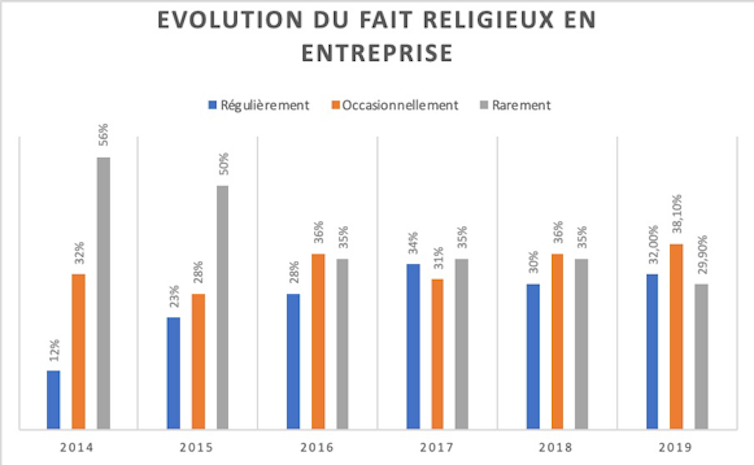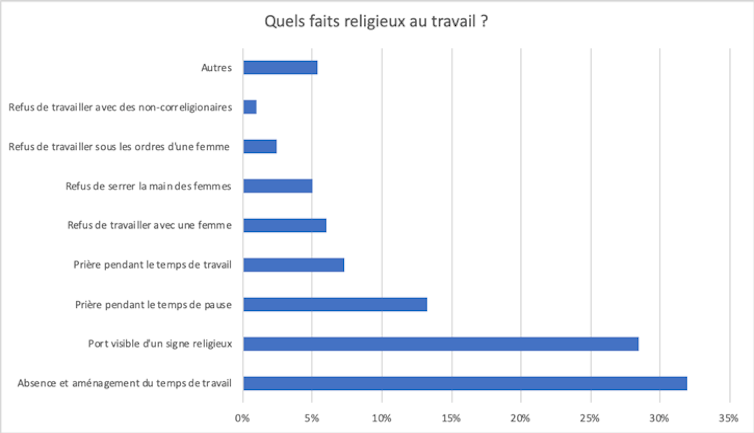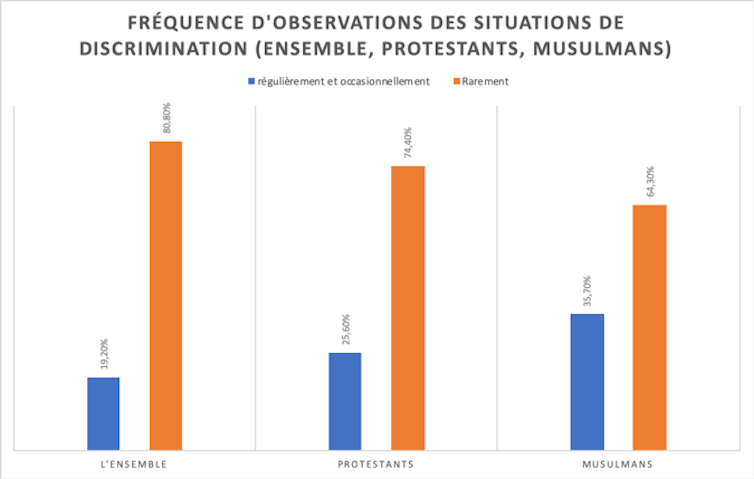[ad_1]
Current occasions present it effectively, the place of faith in French society is debate. The corporate is clearly not airtight with regard to its surroundings it isn’t stunning that the place of religion at work even be questioned.
The report of the Institut Montaigne, produced in collaboration with the Observatoire du fait religieux en entreprise (OFRE) entitled “Religion at work: believing in dialogue”, printed on November 7, 2019, attracts up a listing of the presence of faith in work conditions and the way it questions managerial motion. As well as, this work highlights the existence of two realities of faith at work which might be more and more distinct from one another.
Requests regarding working time
Greater than 70% of respondents to the Institut Montaigne and the OFRE survey meet often (day-after-day, week or month) or sometimes (each quarter, a number of instances a yr) non secular details at work. This determine is barely increased than in recent times.

Religion at work: believing in dialogue. Religious Business Barometer 2019.
.
Probably the most frequent non secular details are the requests regarding working time: requests for the punctual institution of schedules, work schedule, planning of holidays, requests for absences, and so forth. These questions regarding attendance at work and dealing time account for almost one-third of spiritual details.

Religion at work: believing in dialogue. Religious Business Barometer 2019.
.
The seen port of indicators represents a bit greater than 1 / 4 of the details recognized. The third most typical is the person observe of prayer throughout breaks. These three frequent sorts of details have the frequent function of indirectly calling into query the group of labor and its functioning. This isn’t the case for different sorts of recognized details reminiscent of prayers throughout working time (7%), refusal to work with girls (6%), being managed by girls (2%) and even to shake fingers with girls (5%), proselytism (2%) or refusal to carry out sure duties (5%). These latter details are minor however, not like the earlier ones (requests for time preparations, signal ports, prayers throughout breaks), they straight name into query the group and efficiency of labor and / or interpersonal skilled relations. The overwhelming majority of those details are associated to Islam.
Simply over 80% of the folks surveyed on this survey don’t observe, or very not often, conditions of discrimination of their work surroundings. Practically 9% observe it sometimes, and greater than 10% observe it often. The most typical acts of discrimination encountered by the folks interviewed listed below are associated to hiring, promotions, the distribution of purposeful tasks in addition to to social life (invitation to meals or crew pots, for instance). ). As well as, as proven within the graph beneath, there are vital variations between respondent teams by faith.

Religion at work: believing in dialogue. Religious Business Barometer 2019.
.
A little bit a couple of scenario (54%) out of two requires administration intervention and this leads to tensions and conflicts in 19% of circumstances. These two figures are barely increased than in earlier years.
A non secular reality higher and higher managed
Within the overwhelming majority of French firms involved, faith at work poses few issues. Spiritual details trigger little dysfunction in addition to little stress and battle. On the facet of working towards staff, the most typical perspective is to specific one's religiosity solely on the margins of organizational functioning. They don’t systematically give the non secular motive for a request for absence or planning a schedule and in the event that they pray at work they do it throughout their breaks and in a discreet means. Even sporting the Islamic headband, which is bearing a really delicate difficulty in France, as proven by the current debates, not often causes issues at work. Muslim girls who put on it not often refuse to withdraw it when requested by the administration.
More often than not, when administration intervenes in conditions marked by a non secular dimension, it focuses on work and considers faith as an adjunct. Selections, for instance whether or not or to not grant an absence, are made by contemplating the impression on the work and never the non secular justification of the request. Managers don’t think about faith for itself however as one of many dimensions of the one who is the worker. Above all, they’ve a practical method.
Workers are not often claiming and primarily search to make their work life appropriate with their private lives. They clearly prioritize work and search methods to articulate their professionalism and religiosity.
Each staff and managers know what is suitable and what’s not acceptable within the context of their enterprise. This information is the results of experiential studying. It additionally outcomes, in a minority of French firms whose quantity will increase from yr to yr, the implementation of instruments reminiscent of guides and charters on faith at work, guidelines within the inner rules and packages coaching for managers and staff.
There can in fact be friction and frustration however blocking conditions are uncommon. The dialogue stays principally open. The dominant precept is the development of native preparations that protect the correct functioning of the enterprise and spiritual freedom.
When claims turn out to be claims
In a minority of French firms, the scenario may be very completely different. Faith may be very current. In some work conditions, it’s steady. It’s also current by way of all kinds of details. It’s in these conditions that the details that decision into query the group and efficiency of labor or which might be directed in opposition to people are concentrated. Past the most typical details (requests for absence, indicators, prayers throughout breaks) we discover right here the refusal to carry out duties, to work with girls or to be supervised by girls, to work with individuals who don’t observe the identical faith, performing prayers, generally collective, throughout working time, and so forth. Most putting in these conditions is the change in perspective of staff and managers.
On the worker facet, requests flip into calls for. They specific themselves most frequently in teams. Faith and spiritual observe are thought of primacy over work. It’s now not a query of in search of to articulate professionalism and religiosity, however of contemplating that the group and efficiency of labor should adapt to the constraints of spiritual observe. Practitioners don’t hesitate to place stress on non-practicing staff, however who of their opinion ought to be, for instance due to their ethnic origin. Some don’t hesitate to overtly discriminate in opposition to sure classes of individuals, particularly girls. They don’t specific their needs within the type of requests that may result in a dialogue however in search of to impose them by making a stability of energy with the administration.
On the managers' facet, the details are now not considered the results of the expression of the religiosity of staff and linked to their particular person. They’re straight described as non secular and undesirable within the work scenario. Faith is equated with a supply of dysfunction and battle that has no place within the enterprise. It’s now not a query of on the lookout for native preparations by way of dialogue however of countering behaviors thought of undesirable.
Surprisingly, by way of our subject surveys, now we have discovered that the final administration of the businesses most involved by any such scenario ceaselessly have a discourse minimizing them. Native managers, for his or her half, typically say that they lack assist and have problem elevating consciousness of their scenario to their superiors.
Two risks
By way of faith at work in France, there’s probably not a continuum. A overwhelming majority of conditions, folks, behaviors, don’t pose issues. The articulation between, on the one hand, the functioning of organizations of labor and alternatively the non secular observe, is finished in an clever, pragmatic and peaceable means.
On the margin nonetheless, the issues are actual and reveal logics of confrontation and intolerance. Two risks exist for firms. The primary is to contemplate solely what goes effectively and to disclaim the significance of what’s being performed out in battle conditions. These are minor however not anecdotal. They should defend the rules of working and residing collectively. This requires that enterprise leaders have the braveness to behave within the face of the unacceptable. The second is to contemplate solely the tensions and to assimilate all that’s non secular to a supply of dysfunctions and the undesirable to the danger of inflicting much more stigmatization and frustration …
[ad_2]
Source link









